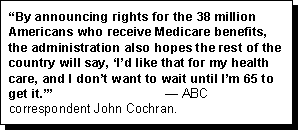 |
|||||||||
|
 |
||
|
 |
||||||||||||||||||||||||
|
||||||||||||||||||||||||
 |
||||||
|
||||||
 |
||||||
|
 |
||||||||||||||||||
|
||||||||||||||||||
 |
||||||||||||||||||||||||
|
||||||||||||||||||||||||
 |
||||||||||||||||||
|
||||||||||||||||||
|
|
|
Thursday, June 25, 1998 - Vol. Two, No. 26 - Media Inquiries: Keith Appell (703) 683-5004

Networks Push for New Regulations of Managed Care, Disregard Free Market Ideas Only Liberal HMO Solutions Allowed When President Clinton on Tuesday announced new regulations for Medicare providers, the networks had a common reaction -- one way or another, it was an opportunity for them to bash private medical care.
ABC and CBS focused on how the new regulations could lead to more regulation of private managed care. "We begin tonight with some of the biggest changes in the history of Medicare, which are bound to have an effect on the health care system in general," said Peter Jennings on that evening's World News Tonight. "Today President Clinton ordered the changes to be made so as to give almost 40 million Americans greater rights, and this won't be the end of it." Correspondent John Cochran then explained that "health care companies say they support the Medicare rights the President announced today, which is surprising, since they had launched an all-out ad campaign against legislation guaranteeing similar rights for non-Medicare patients." According to Cochran, "By announcing rights for the 38 million Americans who receive Medicare benefits, the administration also hopes the rest of the country will say, 'I'd like that for my health care, and I don't want to wait until I'm 65 to get it.'" And CBS correspondent Sharyl Attkisson told viewers that "even though the standards only cover Medicare and federal health plans, the administration hopes it will pressure private plans to offer the same guarantees." Similar measures "that would apply to all patients, the so-called patients' bill of rights, have languished in Congress for months," she reported. "With today's rules the President extended those guarantees to one-third of all Americans without having to go through Congress." But none of these reporters informed viewers of the possible consequences of extending such regulations to private managed-care plans. The March 7 edition of The Economist, a British weekly, argued that such legislation would "push up premiums. Some firms will respond by ceasing to provide health insurance for their staff," while others "will compensate for increased benefits by squeezing wages." As for problems at HMOs, the magazine noted that "the government suppresses competition through the tax code." Because health insurance provided by employers is tax-free, while insurance bought in other ways isn't, workers "are forced in effect to take whatever package their employer chooses, rather than the one they might prefer themselves." The result: "Since the employer is the customer, HMOs compete more than they otherwise would on price rather than on quality or convenience." According to The Economist, "The benefits of competition would be all the greater if the government could bear to meddle a bit less." This is an argument American journalists can't bear to report. -- Tim Lamer
Home | News Division
| Bozell Columns | CyberAlerts |







 NBC Nightly
News was the most aggressive. Tom Brokaw announced that it was "a new day for
Medicare with more choices and a wider range of coverage," with "Medicare now
offering a lot more than many private insurance companies." But according to
correspondent Bob Faw, "The fact that for-profit HMOs welcome the new rules make some
think the changes are not what they're cracked up to be." He then ended with quotes
from Public Citizen's Dr. Sidney Wolfe (who said HMOs are "not to be trusted")
and from a Medicare recipient who lashed out at the profit motive: "When you make a
profit, you are doing so at the expense of the beneficiary, therefore I do not trust the
private sector."
NBC Nightly
News was the most aggressive. Tom Brokaw announced that it was "a new day for
Medicare with more choices and a wider range of coverage," with "Medicare now
offering a lot more than many private insurance companies." But according to
correspondent Bob Faw, "The fact that for-profit HMOs welcome the new rules make some
think the changes are not what they're cracked up to be." He then ended with quotes
from Public Citizen's Dr. Sidney Wolfe (who said HMOs are "not to be trusted")
and from a Medicare recipient who lashed out at the profit motive: "When you make a
profit, you are doing so at the expense of the beneficiary, therefore I do not trust the
private sector." 